There are many different types of divorce you can opt for in Ontario. However, the fastest and cheapest way to get a divorce in Ontario is to opt for an uncontested divorce.
While it is affordable and quick, it might not be possible in all cases. So, if you think you can opt for an uncontested divorce in Ontario to save money, time, and effort, here is what you must know.
What is an Uncontested Divorce in Ontario?
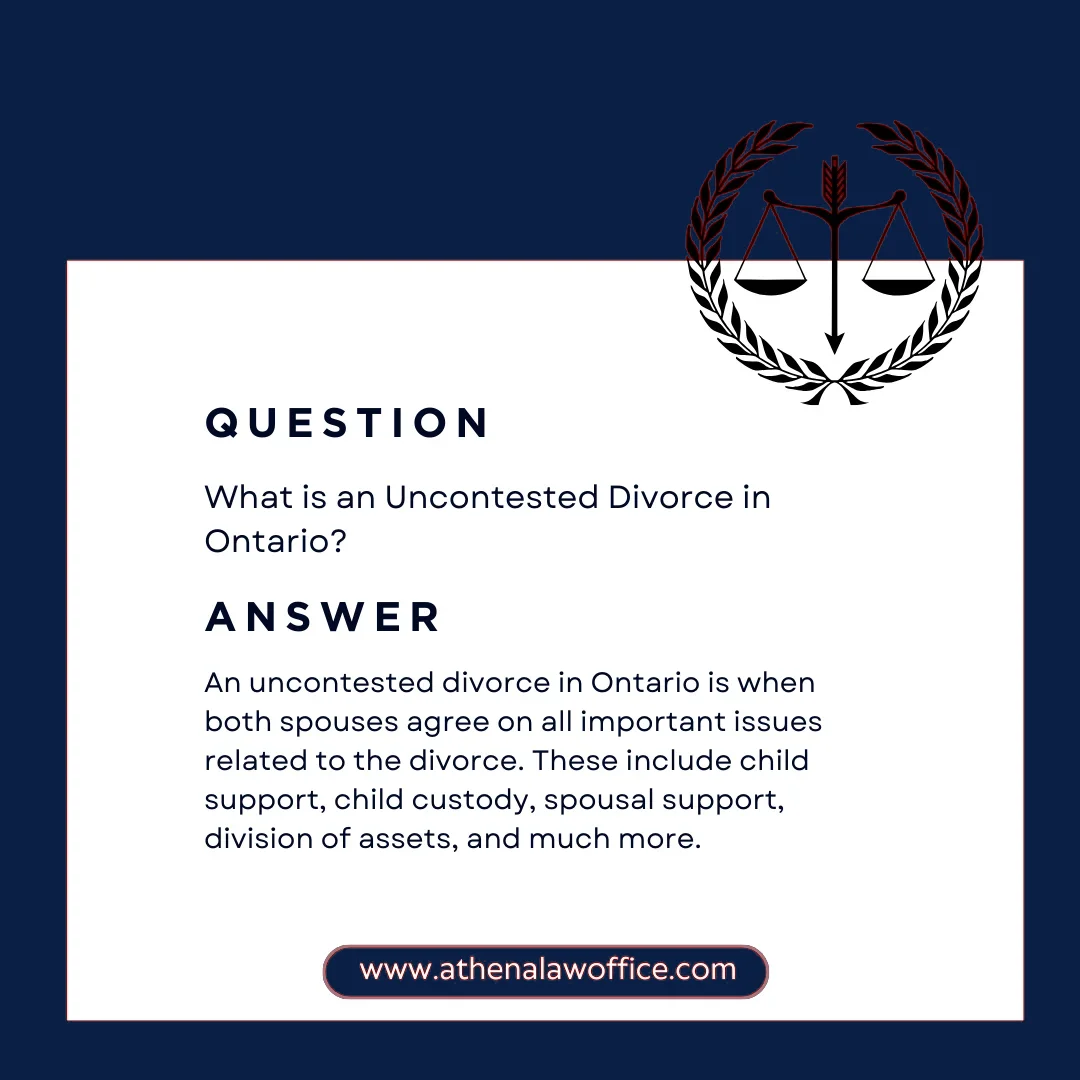
An uncontested divorce in Ontario is when both spouses agree on all important issues related to the divorce. These include child support, child custody, spousal support, division of assets, and much more.
It is an approach that requires communication and collaboration to resolve the divorce matter as fast as possible. If there are disagreements, the divorce process can take much longer.
Here are the two types of uncontested divorce in Ontario you can choose from:
Uncontested Sole Divorce
An uncontested sole divorce fulfills the above requirement. However, either the husband or the wife files for the divorce in court.
Then, the other party will receive these papers and they have thirty days to challenge or contest. During this time, they can also make other claims for custody, property, etc.
However, if the spouse doesn’t challenge anything within this time frame, then the divorce will remain uncontested, and the courts will finalize it.
Uncontested Joint Divorce
The other type of procedure is the uncontested joint divorce. In this type, both the spouse file and sign the divorce.
One spouse is not suing the other for divorce, as it means that both parties want the divorce. For uncontested joint divorces, the spouses can also ask the court to include court orders related to access and custody if both spouses are in agreement with the terms.
Requirements for Filing for Uncontested Divorce in Ontario
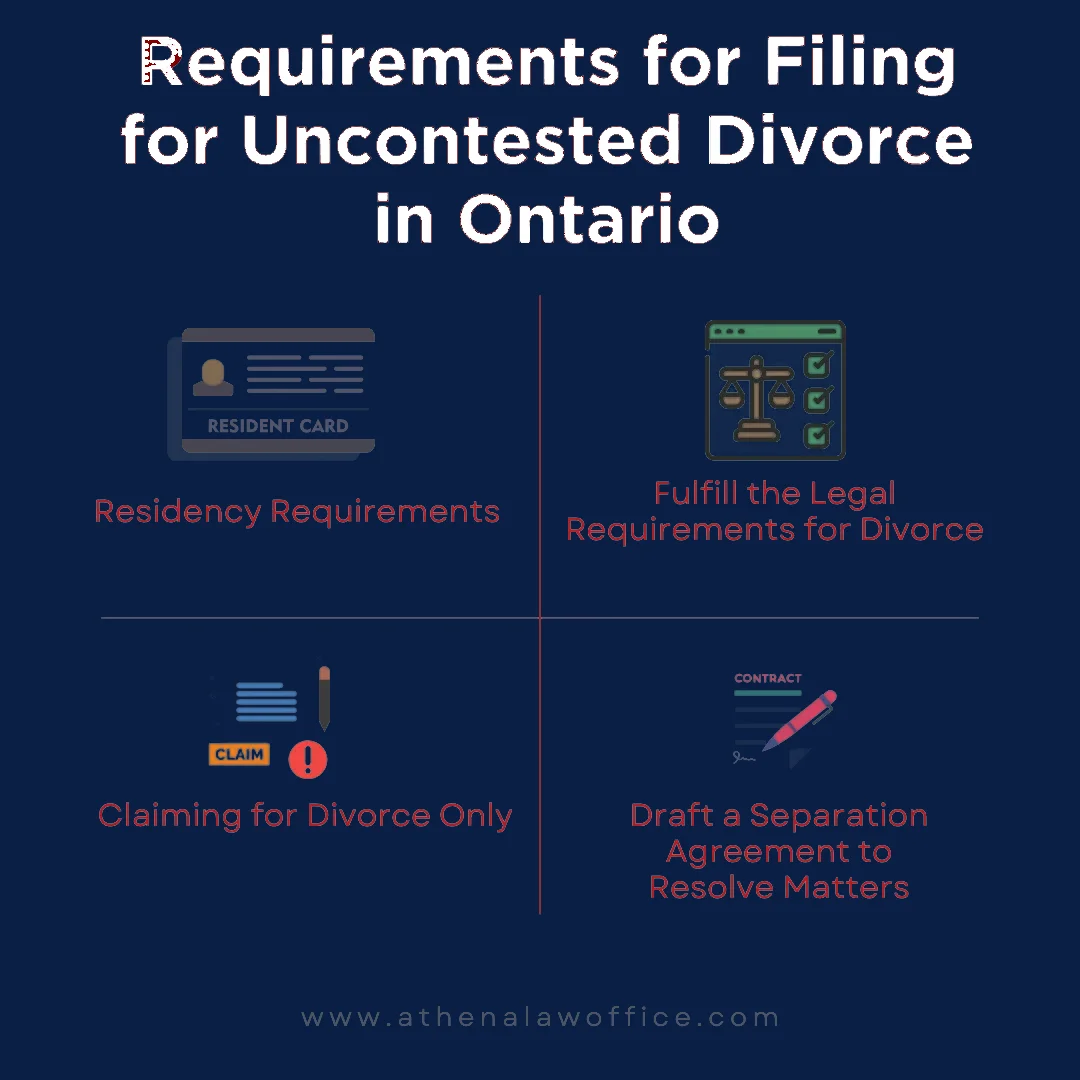
Before you file for an uncontested divorce in Ontario, it is crucial to meet some requirements for the application to be accepted. These include the following:
1. Residency Requirements
The first requirement you and your spouse must meet is of residency. Either you or your spouse should be currently residing in Ontario or you must have been residing for at least one continuous year when the divorce is filed.
In simple terms, this means that before filing for an uncontested divorce, you or your spouse should be residing in Ontario for a minimum of a year.
2. Fulfill the Legal Requirements for Divorce
According to The Divorce Act, you must live separately from your spouse for a year to be eligible for divorce. This doesn’t necessarily mean living in different physical locations.
You can live in the same house and still be separated. You can file for the divorce before the separation period, but the court will only grant you the divorce once this separation period ends.
Two other grounds must also be met, which include adultery or mental or physical cruelty. From these two grounds and one year of separation, you can meet any one of the three requirements.
If you want more clarification regarding separation, you can ask our lawyer important questions regarding separation in Ontario for more clarification.
3. Claiming for Divorce Only
When you are filing for an uncontested divorce in Ontario, you are only allowed to ask the court for a divorce. This means you can’t claim for custody or access or other issues.
Instead, you and your spouse already have to agree on these matters before filing for an uncontested divorce. If you can’t agree on the terms, you can opt for divorce mediation or seek the help of a professional to ensure you fulfill these legal requirements.
4. Draft a Separation Agreement to Resolve Matters
We recommend you draft a separation agreement in Ontario before filing for an uncontested divorce. This is not a requirement, but one important note we recommend.
The reason for this is that instead of letting the court handle this matter, you can handle it yourself and have more control over the decision-making of important matters.
So, if you want the divorce to be more affordable and require autonomy over decision-making, then don’t forget to draft a separation agreement.
What Circumstances Hinder Uncontested Divorce in Ontario?
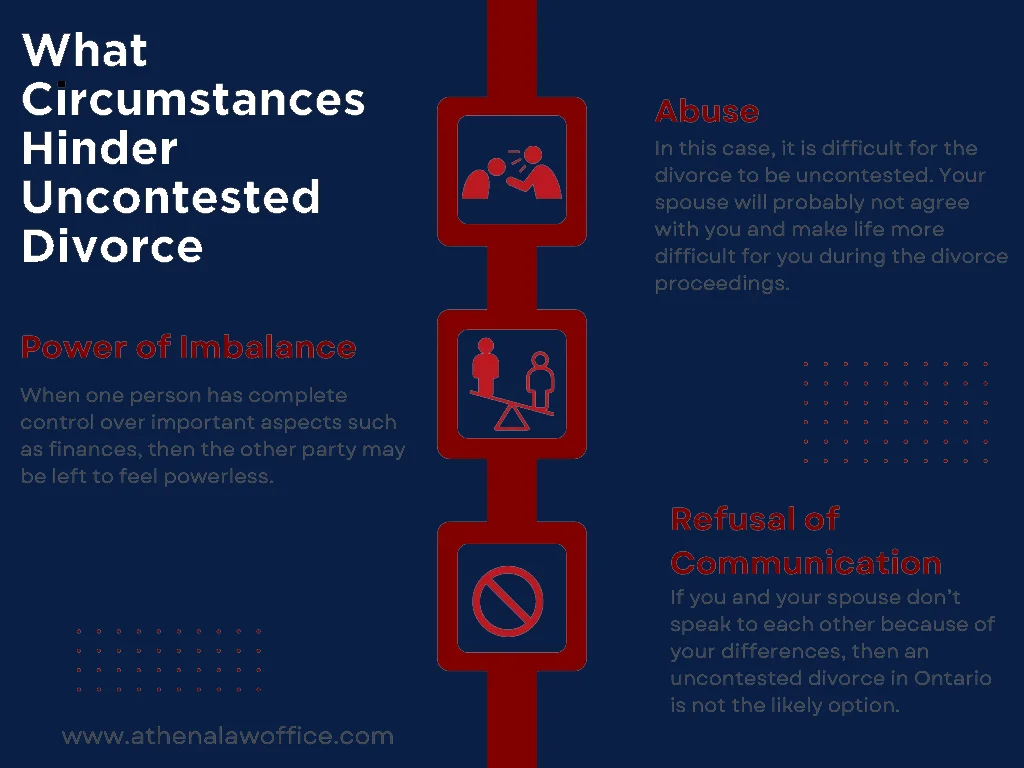
Please not that every marriage is unique, and an uncontested divorce might not be viable in all circumstances. Instead, in some circumstances, this may not even be an option.
Such circumstances include the following:
1. When Abuse is Involved
In this case, it is difficult for the divorce to be uncontested. Your spouse will probably not agree with you and make life more difficult for you during the divorce proceedings.
So, if you are experiencing cruelty from your spouse, then this option might not be the best for you. We recommend you get in touch with our divorce lawyer to provide you with the right options.
2. When the Power Imbalance in the Relationship is Significant
If you and your spouse have a significant power imbalance in the relationship, then an uncontested divorce may not be the right choice. For example, when one person has complete control over important aspects such as finances, then the other party may be left to feel powerless.
In such a situation, it can be challenging to come up with an amicable solution with your spouse that will make both of you happy. So, be sure to determine whether this is an issue in your relationship.
3. When You and Your Spouse Refuse to Speak to One Another
Finally, if you and your spouse don’t speak to each other because of your differences, then an uncontested divorce in Ontario is not the likely option.
An uncontested divorce requires communication so that both parties can come to an agreeable solution. So, if you and your spouse don’t speak to each other, then this may not be the option for your divorce.
Contested vs. Uncontested Divorce in Ontario
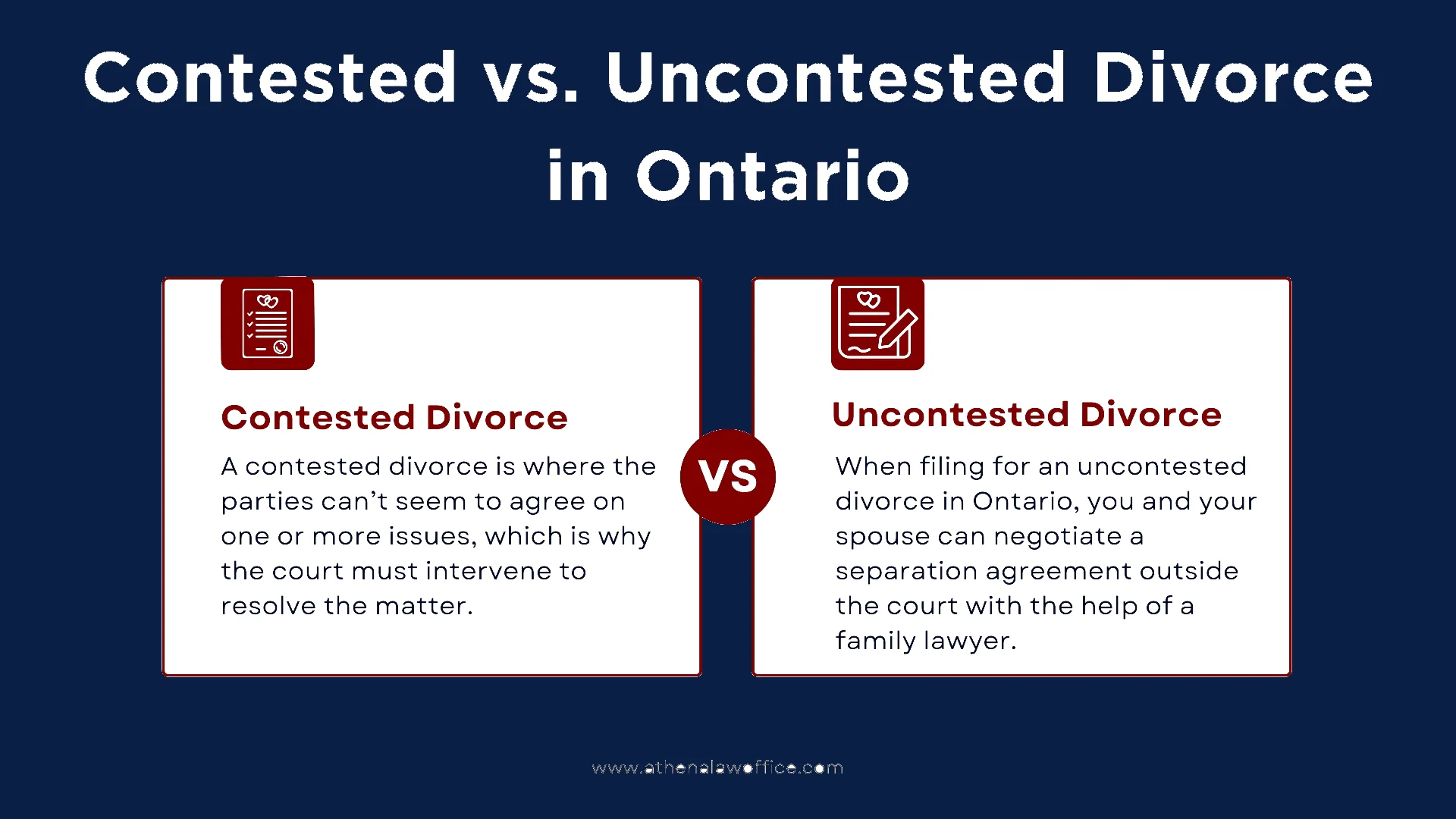
Before filing for an uncontested divorce in Ontario, you might wonder about the difference between contested and uncontested and which route is better for you.
The main difference between these two is that in an uncontested divorce, both parties agree on all the issues related to the divorce.
On the other hand, a contested divorce is where the parties can’t seem to agree on one or more issues, which is why the court must intervene to resolve the matter.
When filing for an uncontested divorce in Ontario, you and your spouse can negotiate a separation agreement outside the court with the help of a family lawyer.
Filing for Uncontested Divorce in Ontario without a Lawyer
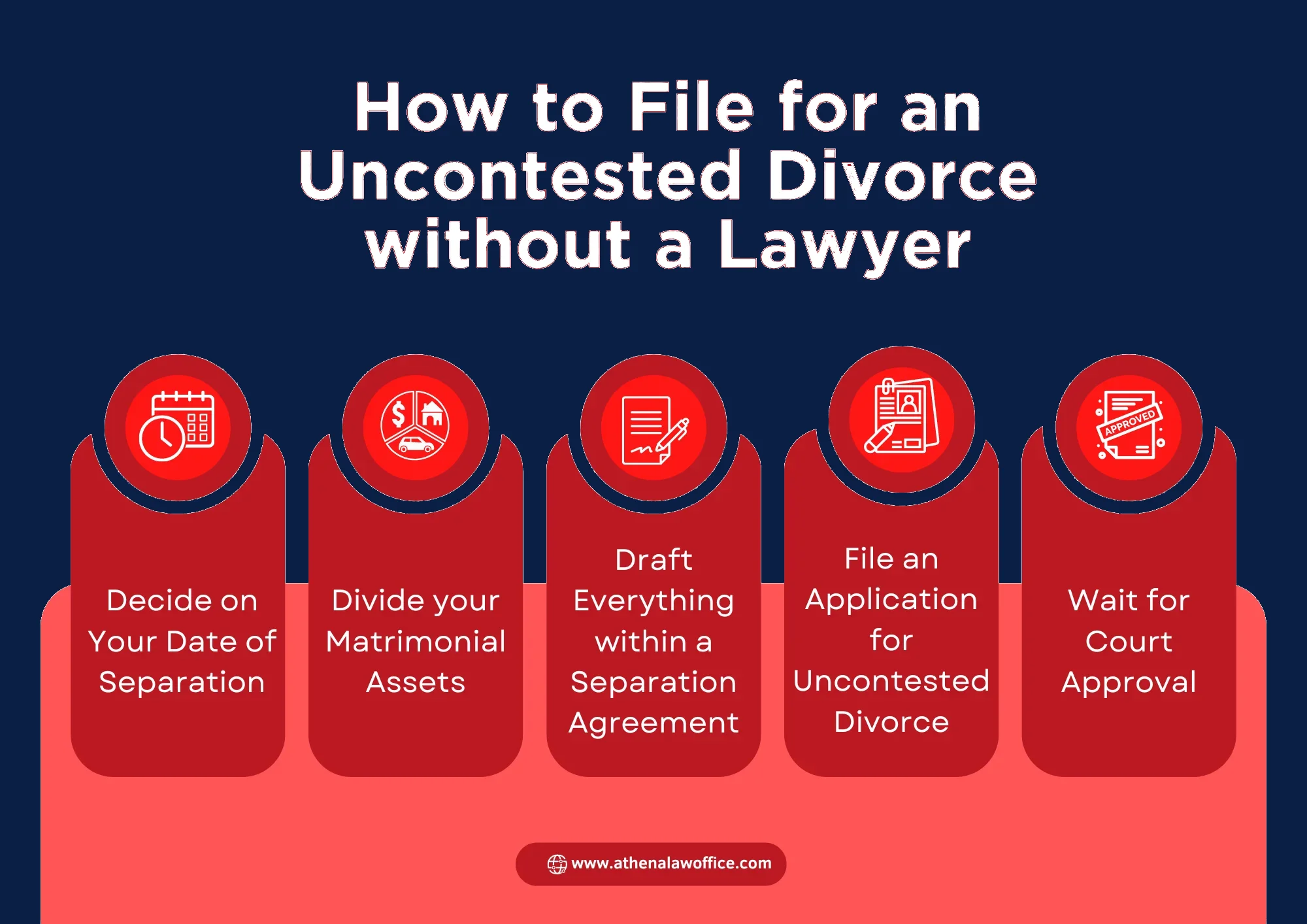
Now that you have an idea of the basics regarding an uncontested divorce in Ontario, you might wonder how to file for divorce. Here is what you need to know about filing for an uncontested divorce in Ontario without a lawyer:
1. Decide on Your Date of Separation
You must decide on your separation date before filing, as you will have to prove to the court that you have fulfilled one year of separation. If you don’t fulfill this separation period, the court will not grant you a divorce.
So, make sure you and your spouse mutually discuss the date you want to set as your separation date.
2. Divide your Matrimonial Assets
Once you decide on the separation date, it is time to divide your matrimonial assets. This includes all your assets and debts to ensure a fair division for both parties.
If you want to learn more about this, you can read our blog on the equalization of net family property as we take a deep dive into the matrimonial property and its division in Ontario.
3. Draft Everything within a Separation Agreement
The next thing you need to do is draft all your conditions and agreements into a separation agreement. Such an agreement will include all your important matters so that you don’t have to depend on the court to resolve these matters for you.
You can create the separation agreement on your own and have a lawyer review it. However, you can also discuss this matter with a lawyer and let them draft a separation agreement for you and your spouse.
4. File an Application for Uncontested Divorce in Ontario
Now that you have everything in place, it is time to file the application for an uncontested divorce in Ontario. You will need to fill out the uncontested divorce forms to begin this process.
For example, you will need to complete Form 8A: Application and Form 36: Affidavit for Divorce.
In addition to these applications, you must also file your original marriage certificate and register your divorce proceedings. Besides that, we recommend you complete and file forms for any relief related to your divorce.
If you have agreed on important matters, then be sure to file Form 13.1: Financial Statement and Form 35.1: Parenting Affidavit. Filing these documents will help you expedite your uncontested divorce in Ontario.
5. Wait for Court Approval
Once you file and submit all the relevant uncontested divorce forms and applications in Ontario, you will have to wait for court approval. The court will review your application and documents.
They will see whether you have fulfilled all the legal requirements. Then, if the courts are satisfied, they will grant you the divorce.
Please note that even after filing all the documents, you might have to go through some additional processing time before the court fully grants you a divorce.
Another note to keep in mind is that court appearances are generally not the norm for uncontested divorce in Ontario unless the judge deems that the agreement is not fair or the well-being of the children is at stake.
If the court is satisfied with the documentation and believes the terms to be just, then they will issue you a divorce order.
How Long Does an Uncontested Divorce Take in Ontario?
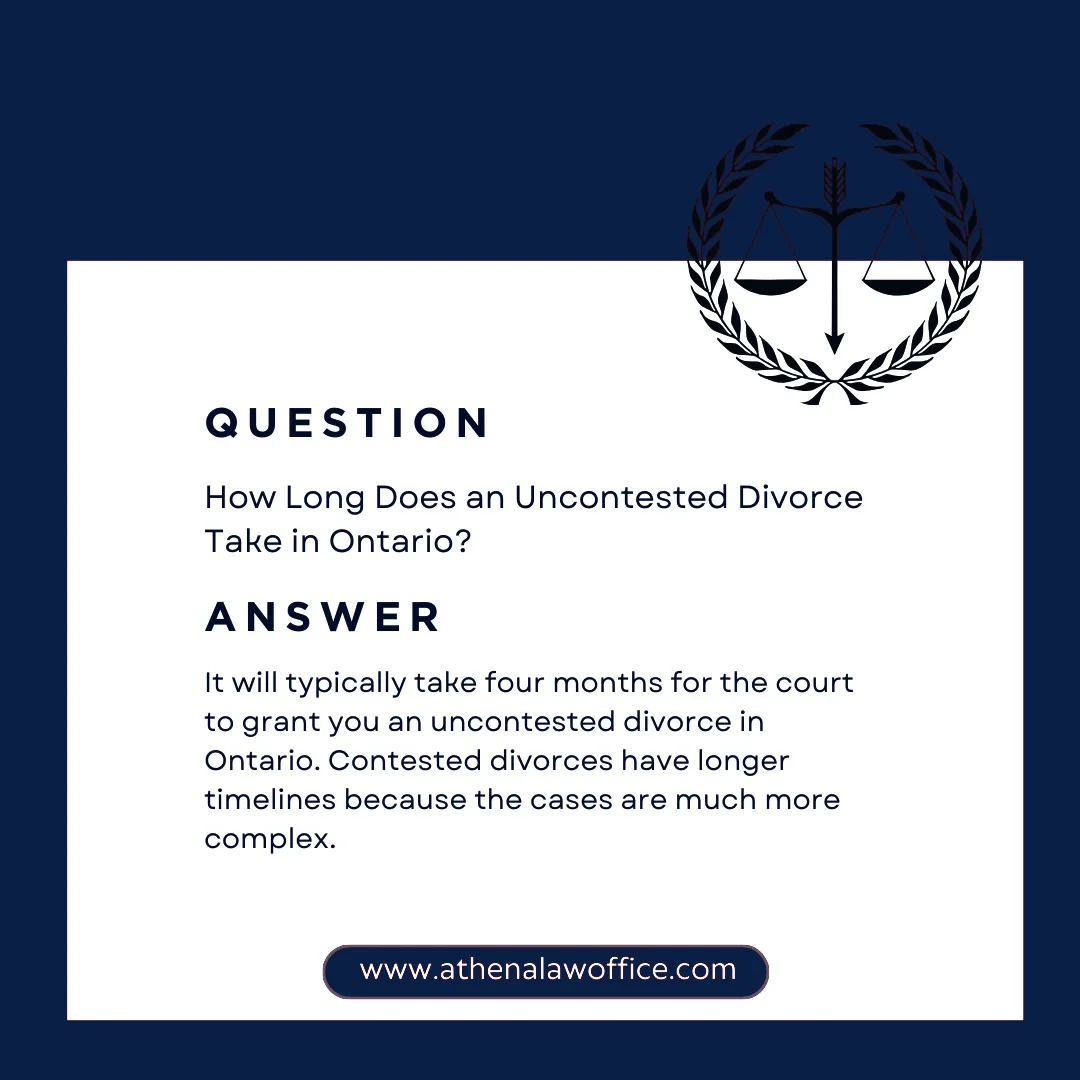
It will typically take four months for the court to grant you an uncontested divorce in Ontario. Contested divorces have longer timelines because the cases are much more complex.
We recommend you sort matters out with your spouse as soon as possible so that the court can grant you a divorce. Then, it will take 3 to 4 months for you to get the divorce granted.
How Much Does an Uncontested Divorce Cost in Ontario?
The government filing fee is $632. In addition, if you hire a family lawyer, you will also have to pay their fee.
Because of this, the cost of uncontested divorce in Ontario can vary, depending on what you opt for.
We recommend you get in touch with a lawyer to help you understand these costs better and be prepared for what you will need to spend on the divorce proceedings.
FAQs
What is the cheapest way to get a divorce in Ontario?
The cheapest way to get a divorce in Ontario is to opt for an uncontested divorce. This option is much more affordable than others, as contested divorces can be costly and time-consuming for both parties.
How do I get an immediate divorce in Ontario?
Only in rare circumstances can you get an immediate divorce in Canada. For example, if you are the victim of intense emotional or physical abuse, and cohabitation with your spouse is impossible, then the courts can grant you an immediate divorce.
Is one-sided divorce possible in Canada?
Yes, you can file the application, serve it to your spouse, attend any meetings, and participate in the trial. After that, it is up to the courts to grant you a divorce after listening to your spouse’s statements.
Who pays for divorce in Canada?
The spouse with more money will be asked to pay for the interim disbursement during the divorce. This is the amount the other spouse in need can use to pay for lawyer fees or any other fee related to divorce.
Final Thoughts
An uncontested divorce in Ontario is the easiest solution to the divorce process. However, it is not applicable to all couples, as it might not be feasible in some circumstances.
However, if you have the chance to get an uncontested divorce, then we recommend you going for this option. You can get in touch with our divorce lawyer in Ontario to learn more about the best route for your unique case.
Author Profile

- Barnett Law is a trusted and knowledgeable lawyer in Scarborough. Her expertise spans real estate law, family law, adoptions and fertility law. A lawyer by profession and a humanitarian by heart, Athena Narsingh Barnett wants to help people become more familiar with the legal system and be well-informed to make important legal decisions.
Latest entries
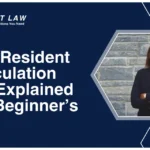 Real Estate LawJanuary 30, 2026Non Resident Speculation Tax Explained For Beginners
Real Estate LawJanuary 30, 2026Non Resident Speculation Tax Explained For Beginners legal guidanceNovember 12, 2025How To Avoid Land Transfer Tax Ontario?
legal guidanceNovember 12, 2025How To Avoid Land Transfer Tax Ontario?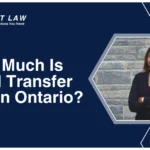 legal guidanceOctober 31, 2025How Much Is Land Transfer Tax In Ontario?
legal guidanceOctober 31, 2025How Much Is Land Transfer Tax In Ontario? Family LawOctober 27, 2025How Much Does A Divorce Cost In Ontario In 2025?
Family LawOctober 27, 2025How Much Does A Divorce Cost In Ontario In 2025?

